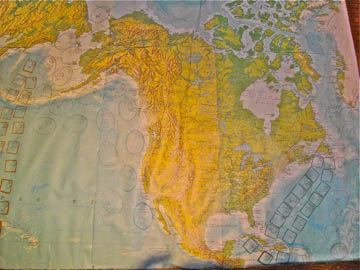 |
| Handmade board for The Whale Race, showing migratory paths of whales, by Solomon Spigel, age 10 |
When my boys were young they made countless games, each one providing a rich learning experience. I was inspired to teach board games after my son Solomon made three increasingly sophisticated versions of his Whale Race Game (board pictured here).
Since that first class, I have seen an endless variety of boards and games. My students never fail to surprise me! Making a game is a course in research, game design, writing, communication, and creativity. The curriculum outline for the entire course is at the end of my book, Education Uncensored. But all you really need is to give your child the raw materials and watch him go.
Blank game boards, with pawns and dice, can be purchased inexpensively from Bare Books (Treetop Publishing). This company also stocks blank hardcover books, blank comics, dialogue bubble templates (or stencils), blank calendars, and more: the perfect materials to inspire young imaginations.
I ask my students to choose a topic that they want to learn more about, and then I teach them how to do a wide variety of research (encyclopedias, periodicals, asking librarians, visiting specialized libraries and museums, interviewing people in specific professions, advanced internet search). We also look at board games and discuss how they are played. We examine board game instructions and how they are written. In the end, the only rules are the ones that the game maker creates and the players agree to play.
|

